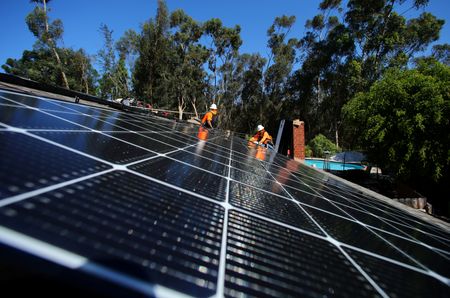 1
1 1
1

By Nichola Groom
(Reuters) – A bipartisan group of U.S. lawmakers in the House of Representatives on Thursday will introduce a resolution to repeal President Joe Biden’s suspension of import tariffs on solar panels from four Southeast Asian nations, according to a statement provided to Reuters.
The move is aimed at propping up domestic solar manufacturers, which have struggled to compete with cheap panels made overseas – often by Chinese companies. The measure is being introduced under the Congressional Review Act (CRA), a law that allows Congress to reverse federal rules with a simple majority.
“We cannot allow foreign solar manufacturers to violate trade law, especially when it comes at the expense of American workers and businesses,” Representative Dan Kildee of Michigan, a Democrat, said in a statement.
A Commerce Department probe last year found that some solar panel makers were dodging U.S. tariffs on Chinese-made goods by moving their products through Cambodia, Malaysia, Thailand and Vietnam. New proposed duties on imports from those countries will not kick in until June of 2024 because of a two-year waiver from Biden.
Kildee is introducing the CRA with three Republicans – Bill Posey of Florida, Garret Graves of Louisiana, and Bob Latta of Ohio, as well as two other Democrats – Bill Pascrell of New Jersey and Terri Sewell of Alabama.
A CRA bill expires if it is not passed within 60 days of its introduction and prevents the federal government from issuing a rule that’s “substantially the same form” in the future.
A repeal of the policy would be a blow to U.S. solar project developers, who have argued that tariffs on imports from Southeast Asia would increase their costs and freeze development of the clean energy projects needed to meet Biden’s ambitious climate change goals.
The four nations account for about 80% of U.S. panel supplies.
Responding to those concerns, Biden last year waived tariffs on solar products from the four Asian nations as the Commerce Department was considering whether those imports were circumventing duties on goods made in China and violating U.S. trade law.
Months later, the Commerce Department issued a preliminary decision to extend existing tariffs on Chinese solar products to goods from those nations.
The White House has said the tariff exemption will serve as a bridge while the U.S. sector ramps up. Biden’s Inflation Reduction Act, passed last year, includes big incentives for domestic manufacturing of clean energy products.
The White House did not immediately respond to a request for comment.
(Reporting by Nichola Groom; Editing by Christopher Cushing and Aurora Ellis)